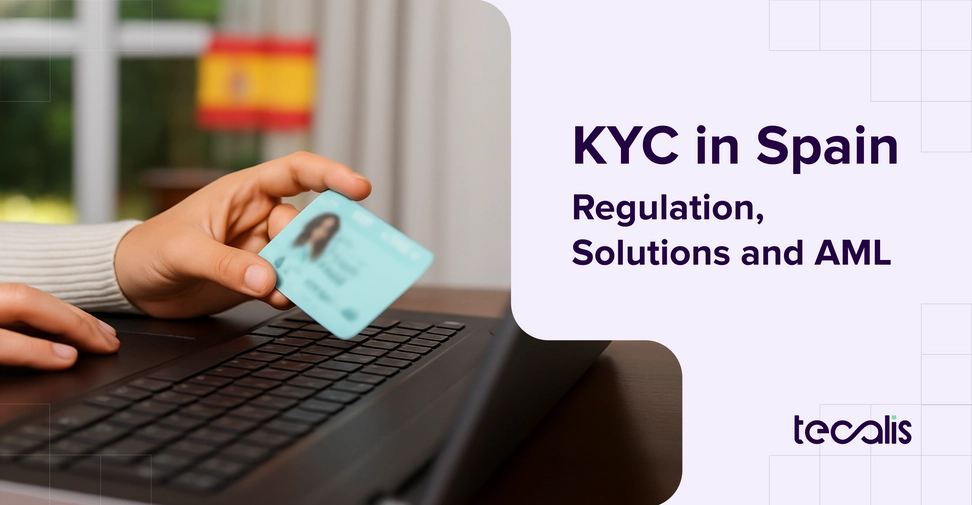Index
Get the latest news right in your inbox
In today's financial and business ecosystem, trust is the most valuable currency. However, in a digitalized environment, verifying a customer's identity, a process known as KYC (Know Your Customer), has become a fundamental pillar not only for trust but also for the legal survival of companies. KYC in Spain is not a simple formality; it is a complex web of legal obligations designed to prevent money laundering (AML) and terrorist financing.
The Spanish market, regulated by strict European and national regulations, presents unique challenges. Companies must implement robust identification processes that comply with Spanish KYC regulations, without sacrificing the user experience. Digitization has forced an evolution of traditional onboarding, where biometrics, artificial intelligence, and electronic signatures almost entirely eliminate errors and boost trust and security with elements that humans are unable to detect.
This article takes an in-depth look at the KYC and AML landscape in Spain. It explores the specific regulations that define these obligations, the characteristics that the best KYC solutions in Spain must have to ensure compliance, and how these processes are integrated into secure digital onboarding.
KYC in Spain: What it is And How it Has Been Regulated
KYC in Spain is the set of processes and procedures that entities, especially those required by law, must carry out to verify the identity of their customers. These processes go beyond simply knowing a name and ID number. They involve understanding the nature of the customer's activity, assessing their risk, and, crucially, identifying the beneficial owner or ultimate beneficiary behind any corporate structure.
The primary objective of KYC is prevention. By unequivocally identifying users, organizations create a fundamental barrier to entry against malicious actors seeking to use the financial system for illicit activities, primarily money laundering and terrorist financing.
In Spain, this process is mandatory for a wide range of sectors, known as "obligated entities," according to Law 10/2010.
KYC Regulations in The Spanish Market
The KYC regulatory framework in Spain is a multi-layered system that harmonizes European directives with national legislation.
1. The European Framework: The AML Directives
As a member state, Spanish regulation stems from European Union directives. The EU's anti-money laundering directives have evolved to keep pace with new scenarios and types of crime, imposing sanctions to deter future crimes and ultimately harmonizing the laws of member states to avoid discrepancies in criteria when judging a crime within the union.
Sixth AML Directive (6AMLD): this is the anti-money laundering legislation currently in force. Although this evolution is more focused on harmonizing money laundering crimes in the EU, it reinforces the criminal liability of legal entities (companies) for failures in supervision, which indirectly puts pressure on them to have more robust KYC systems that do not allow errors when recognizing end users and beneficiaries of money.
2. Spanish Legislation: Law 10/2010 and SEPBLAC
At the national level, the cornerstone of all KYC regulations in Spain is Law 10/2010, of April 28, on the prevention of money laundering and terrorist financing.
This law transposes European directives into Spanish law and establishes specific obligations. Its key points include:
- Identification of regulated entities: it defines an exhaustive list of entities that must apply KYC/AML measures. This group includes, among others, credit institutions (banks), insurance companies, fund managers, real estate developers, tax advisors, lawyers (in certain transactions) and, following the latest updates, virtual asset service providers.
- Due Diligence Obligations: the law requires these entities not only to identify the customer through a KYC process, but also to apply due diligence measures. The Due Diligence process is based on a risk-based approach (RBA), which requires the entity to classify customers (low, medium, or high risk) and apply proportionate measures.
While measures are somewhat simplified for low risks, enhanced measures for high-risk individuals, such as PEPs (Politically Exposed Persons), involve more thorough scrutiny to verify the origin of their funds and movements.
3. The Regulator: SEPBLAC
The Executive Service of the Commission for the Prevention of Money Laundering and Monetary Investments (SEPBLAC) is Spain's supervisor and Financial Intelligence Unit (FIU). Its role is critical:
- Supervision and inspection: SEPBLAC actively monitors compliance with Law 10/2010 by regulated entities.
- Sanctions: authority to impose very severe penalties for non-compliance, which can amount to millions of euros or the revocation of licenses.
- Guidelines and authorizations: one of the most important points for digital KYC onboarding. SEPBLAC defines how a customer can be identified remotely in a way that is legally equivalent to physical identification.
Through its authorizations, SEPBLAC has approved specific methods of remote identification, notably video identification (synchronous and asynchronous) and the use of qualified electronic certificates (such as the DNIe).

Best KYC Solutions and Systems in Spain
Given this strict regulatory landscape, companies cannot afford to use just any verification method. The best KYC solutions in Spain are not necessarily the cheapest, but those that guarantee regulatory compliance (especially with SEPBLAC guidelines) while providing a smooth user experience that minimizes dropouts in the registration process.
When evaluating an eKYC technology solution, a set of technical and functional characteristics must be analyzed.
Key Features of a High-Performance KYC Solution in Spain:
- Explicit Compliance with SEPBLAC: this is a non-negotiable feature in Spain for medium- or high-risk digital onboarding. The solution must offer authorized remote identification methods.
- Asynchronous Video Identification: the user records a video of themselves showing their identity document. The platform must use AI to verify the authenticity of the document and facial biometrics, although Spanish regulations require subsequent human review by a qualified agent to validate the operation.
- Synchronous Video Identification: a real-time video call between the customer and a qualified agent, who performs the verification live.
- Document Verification Technology: the solution must not be limited to capturing a photo of the ID card. It must analyze it.
- OCR (Optical Character Recognition): automatic extraction of data from the document (name, number, expiration date) to autocomplete forms, reducing friction and human error.
- Forensic Document Authentication: the software must be able to verify the authenticity of the document in real time, checking security measures such as holograms, microtext, ultraviolet patterns, and the consistency of the MRZ (Machine Readable Zone).
- Advanced Biometrics And Proof of Life: to ensure that the person performing the process is who they say they are and that they are physically present, the following is required:
- Facial Comparison: a biometric engine that compares the user's selfie with the photograph on the identity document, giving a percentage match.
- Life Detection: essential for preventing identity theft attacks using photos, videos, or masks.
- Connectivity With Sanctions Lists: KYC is the step prior to AML. The solution must automatically integrate with global databases to screen the customer against lists of:
- PEPs (Politically Exposed Persons).
- International sanctions lists (OFAC, EU, UN, etc.).
- Adverse media: search for negative news related to financial crimes.
- Flexibility and APIs: the best KYC platform acts as an "orchestrator." It must allow, through a robust API, the design of customized verification flows that adapt to the customer's risk level, combining different technologies in a single flow.
- eIDAS compliance: the solution must be compatible with the trust services defined by the regulation, especially if the process culminates in an electronic signature.
What To Consider When Hiring a Know Your Customer Provider
A QTSP (Qualified Trust Service Provider) is an entity audited and certified by a supervisory body (in Spain, the Ministry of Economic Affairs and Digital Transformation) that appears on the EU's "Trusted List." They are authorized to issue qualified certificates and provide other trust services (time stamps, electronic seals) with maximum legal validity throughout the EU.
Often, the KYC process and KYC forms are intrinsically linked to contracting via electronic signature. To manage signatures, especially those with the highest legal status (Advanced and Qualified), companies turn to QTSPs.
When selecting a QTSP, the following questions should be asked:
- Certification and Audit: Are you on the EU Trust List? This is non-negotiable for qualified services.
- Types of Signatures Offered: Does it provide all three eIDAS levels (Simple, Advanced, and Qualified)? Flexibility is key.
- Identification Methods for Issuance: How does it issue qualified certificates? Does it support video identification so that the customer does not have to travel?
- Integration (API and UX): How easy is it to integrate your signature solution into the existing onboarding flow? Is the signing experience seamless?
- Evidence (Audit Trail): Does the signed document include a complete, robust, and legally sound audit trail that collects biometric evidence and qualified time stamps?
KYC and AML in Spain: How To Comply
Compliance with KYC (Know Your Client) and AML regulations in Spain is not a one-off event; it is a continuous life cycle. KYC is the gateway and AML is the ongoing process.
Effective compliance is structured based on the aforementioned RBA. Regulated entities must design an internal AML policy that details how they will manage this risk.
The AML/KYC compliance process step by step:
- Customer Admission Policy: define which customers are accepted and what level of risk is assigned to them. This involves an initial risk "scoring" based on variables such as country of residence, type of product contracted, company structure, or profession.
- Identification and Verification (KYC in Onboarding): data is collected from the document using the approved method and the beneficial owner is identified. For corporate clients, the individuals who own more than 25% of the property (or the principal administrator) must be identified.
- Application of Due Diligence Measures: both normal due diligence for most customers and enhanced due diligence (EDD) if the scoring detects a high risk. This EDD involves more in-depth investigation.
- Continuous Monitoring of The Relationship: as mentioned above, AML does not end with onboarding. The obligated entity must continuously monitor the customer's operations. Customers may change categories or scores. Therefore, the software must continuously reevaluate the customer base to detect changes and treat them appropriately according to their new status.
- Record Keeping and Reporting: documents must be kept for a minimum of 10 years after the end of the business relationship. A special examination must also be carried out for any suspicious transactions and reported to SEPBLAC.

Digital KYC/AML Onboarding in Spain and Electronic Signatures: Contracting
Digital KYC onboarding converges at the moment of truth: contracting. The identification process is not an end in itself, but rather the means to establish a business relationship, which is almost always formalized through a contract.
This is where the synergy between KYC and eIDAS regulations becomes crucial.
The Integrated Digital Contracting Flow
A high-quality digital onboarding process in Spain combines identification and signature into a single, seamless experience, minimizing friction and maximizing legal certainty:
- Start of the Process: the potential customer begins the registration process on the website or app.
- Data Capture: The user fills out the form, ideally auto-completed with OCR.
- KYC Identification and Verification: the company activates the identification method.
- AML Verification: Simultaneously, the KYC solution API checks PEP and sanctions lists.
- Evidence Generation: the KYC system generates a package of evidence.
- Contract Signing: Immediately after successful verification, the contract is presented to the customer.
- Advanced Electronic Signature: the evidence generated in the KYC step can be used to link the signer to the contract signature. This is the most common method for medium risk.
- Qualified Electronic Signature: if the KYC process is carried out using a qualified certificate, the contract signature will have the QES level. Legally, a QES has the functional equivalence of a handwritten signature and enjoys a presumption of authorship, reversing the burden of proof in litigation. It is the preferred option for high-value or high-legal-risk products (mortgages, life insurance).
This integrated flow, where robust KYC identification serves as the basis for an advanced or qualified electronic signature, is the gold standard for digital KYC onboarding in Spain. It allows companies to comply with SEPBLAC requirements while closing contracts with the maximum legal guarantee offered by the eIDAS regulation.
The best KYC solutions in Spain are those that understand the duality of the challenge: they must be tools for regulatory compliance with SEPBLAC and AML and be business enablers, providing fast and frictionless KYC. Native integration with eIDAS trust services and electronic signature platforms is a necessity for closing the customer acquisition cycle securely and efficiently in the digital age.
























